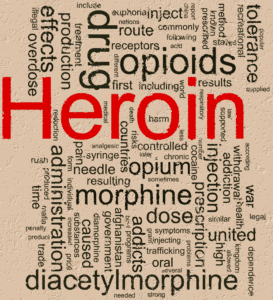
Heroin, also known as diamorphine is derived from the drug morphine, which is extracted from the opium poppy. Heroin is an opioid used for its euphoric or painkilling effects in the brain. It is highly addictive.
Regular use of heroin will lead to an increase in tolerance whereby more and more is needed to get the same effect. Drowsiness and the slowing of cardiac function and breathing may continue for several hours after use of heroin. These are the principal reactions that feature in those incidences of overdose that prove fatal.
Detoxification is the term used for the process whereby the withdrawal symptoms of the opioid are eliminated from the addicted individual safely and effectively. While rarely life threatening, heroin withdrawal symptoms can be decidedly uncomfortable and may include anxiety, tremors, sweating, runny nose, insomnia, nightmares, weight loss, nausea, vomiting, aches and cramps and of course craving for the drug.

Most heroin withdrawal symptoms reach the peak of severity within 2 to 4 days then tail off by day 7. The withdrawal process may continue for weeks and occasionally even months. The clinical team will do all they can to make heroin detox as easy as possible by reducing symptoms and general discomfort.
Anticipation of heroin withdrawal symptoms contributes to addiction’s hold and is partly what demotivates someone addicted to heroin from taking action to come off the drug. Recognition of the psychological dimension of detoxification from heroin is vital to the successful management of the heroin withdrawal process.
As the patient is handing over control of his/her heroin use – perhaps for the first time – it is important for clinicians to explain and discuss the heroin detox process with the patient to build trust and confidence.
Each person’s individually tailored detoxification and substance abuse treatment plan will take into account:
Substitute opioid medications with less intense effects than heroin will be prescribed and may be supplemented temporarily by other drugs for symptom management. The treatment of heroin addiction also includes recovery therapy that helps ease any stress, refocus the mind away from agitated preoccupation with symptoms and improve sleep.

There is considerable benefit to be had from undergoing medical detox from heroin within a luxury rehab centre whose primary purpose and purpose is recovery from addiction. In a positive, recovery-oriented environment, the patient has 24-hour access to medical attention and the immediate availability of psychological support and encouragement, including from fellow heroin users and other patients. Seek support from people with whom you can be open and honest.
Detoxification from heroin is never a standalone treatment. Taking care of the withdrawal symptoms is just the start because the potential resumption of heroin use brings with it the very real danger of overdose, given the drop in tolerance once abstinence has been achieved. It is essential that an aftercare program is devised well in advance of discharge that includes heightened awareness of the risks inherent in relapse and how to prevent it.
If you or a loved one is suffering from heroin addiction, remember that quitting instantly is not an option. Let the treatment team at our luxury rehab center in Switzerland help you. Contact us today to begin addiction recovery.